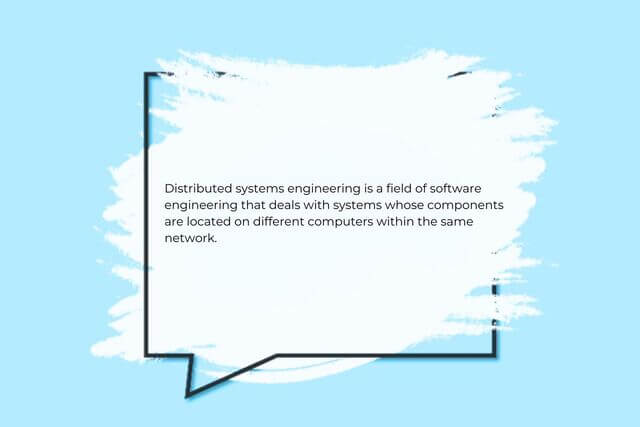


In the ever-evolving technology landscape, distributed systems have become the backbone of many modern applications and services. As the demand for scalable, fault-tolerant, and high-performance systems continues to rise, the role of a distributed systems engineer becomes increasingly critical. This guide aims to provide a comprehensive overview of what it takes to be a successful distributed systems engineer.

Distributed systems engineering falls within the field of software engineering and involves managing systems where individual components are situated on distinct computers connected within a shared network. In essence, a distributed system uses multiple computers that collaborate and exchange information to accomplish a shared goal. Below are the most important aspects of distributed systems engineering:
Distributed systems should be able to operate across various networks, types of computer hardware, programming languages, operating systems, and diverse implementations by multiple developers.
In a distributed system, all available resources should be accessible for direct or remote use by multiple computers within the system. This includes the sharing of hardware components like hard disks and printers for cost minimization and enhanced convenience. Additionally, the sharing of data and software components is essential to maintain a continuous exchange of information.
A distributed system embraces openness concerning both the hardware and software operating on it. The features defining its openness include a published interface, standardized interfaces, and any additional components that can be added to existing ones.
Both users and programmers should see a distributed system as a single unit, rather than a collection of separate components. Moreover, the system should indicate transparency in various aspects, including its location, access points, and replication capabilities.
A distributed system should have the potential to grow when there is a substantial increase in the number of users. While the number of computers within the network usually needs to expand in line with the addition of more users, the components themselves should be engineered in a way that will handle the system’s growth. They should be scalable and seamlessly adjust to a larger user base.
Concurrency demonstrates the ability of a distributed system to perform multiple tasks simultaneously. In essence, all of the components operating on different machines within the network perform their tasks in a specified sequence and engage in mutual interaction. Thus, concurrency in a distributed system enhances efficiency and diminishes latency.
Users rely on distributed systems and have come to expect flawless operation every time they need to utilize them. Engineers responsible for configuring the system must ensure that the hardware, software, and network components are structured in a manner that ensures system availability to users, even if something is not working as it should.

Distributed systems engineering offers a range of benefits that contribute to the efficiency, scalability, and reliability of modern computing infrastructure. Here are some key advantages:
Distributed systems can replicate data and services across multiple nodes. If one node fails, others can seamlessly take over. In other words, changes in one node do not necessarily disrupt the functioning of the entire distributed network. The ability of distributed systems to operate in this decentralized fashion provides an additional layer of resilience. In essence, the design philosophy of distributed systems embodies a proactive strategy, ensuring that the impact of failures is minimized and that the system can gracefully adapt to evolving challenges.
Distributed systems can easily scale horizontally with the addition of more machines or nodes. This scalability is particularly beneficial for managing heightened workloads and responding to the evolving needs of users. Additionally, by distributing tasks and requests across multiple nodes, the system not only prevents bottlenecks but also optimizes resource utilization. This flexibility in horizontal scalability empowers distributed systems to adapt dynamically to varying workloads, providing a foundation for ongoing efficiency and responsiveness.
Distributed systems have parallel processing capability that leads to enhanced performance. The system’s ability to process tasks in parallel results in quicker computation and response times, fostering efficiency in handling diverse workloads. Furthermore, the strategic distribution of tasks closer to the location where data is stored minimizes latency, a key factor in optimizing overall system performance. This approach ensures a faster response to user requests, and hence contributes to a more responsive user experience, highlighting the advantages of distributed systems in meeting the demands of modern computing environments.
Distributed systems are often designed with a modular approach, allowing for easier updates and maintenance. As technology evolves and business needs change, distributed systems showcase their flexibility and adaptability. This adaptability is particularly crucial in today’s fast-paced technological landscape, where the ability to swiftly incorporate innovations and adjust to evolving requirements is a hallmark of a robust and future-ready computing infrastructure. The inherent flexibility of distributed systems positions them as a cornerstone for organizations seeking a responsive and agile framework that can grow and evolve in tandem with their operational demands.
Distributing data across multiple nodes introduces an added layer of protection, limiting the impact of potential attacks. Moreover, the replication of critical components within the distributed architecture establishes redundancy, making it considerably more challenging for attackers to compromise the entire system. The comprehensive security features embedded in distributed systems exemplify a proactive approach to cybersecurity, enhancing the overall integrity and reliability of the computing infrastructure.
Do you have IT recruitment needs?
A distributed systems engineer is responsible for designing, implementing, and maintaining distributed computing systems where multiple nodes or computers work together to achieve a common goal. A distributed systems engineer plays a crucial role in creating, maintaining, and optimizing the performance of distributed computing systems, ensuring they meet the requirements of complex, modern applications. The job requires a deep understanding of distributed computing concepts, algorithms, and technologies, as well as ability in collaborating across various technical domains. The role of a distributed systems engineer also depends on the job responsibilities required for a particular organization. Each organization may have different requirements and expectations regarding this position. Now let’s delve deep into what a distributed systems engineer brings to the table.
As discussed above, a distributed systems engineer is a professional who specializes in designing, building, and maintaining distributed systems. Distributed systems are complex software architectures that involve the coordination and communication of multiple independent components across a network. Distributed systems engineers play a crucial role in ensuring that these systems are scalable, efficient, and error-free.
Now that we have a foundational understanding of who distributed system engineers are, let’s move on to the main responsibilities within this role:
System design: Creating the architecture for distributed systems, considering factors like scalability, fault tolerance, and performance.
Networking: Understanding and optimizing the communication protocols and network configurations that facilitate data exchange between different components of a distributed system.
Data management: Implementing strategies for distributed data storage, retrieval, and consistency. This may involve working with distributed databases and caching mechanisms.
Consensus algorithms: Implementing and understanding consensus algorithms that enable distributed systems to reach an agreement on the state of the system, even in the presence of failures.
Security: Ensuring the security of distributed systems by implementing encryption, authentication, and authorization mechanisms to protect data and prevent unauthorized access.
Becoming a distributed systems engineer requires a combination of theoretical knowledge, practical skills, and a passion for solving complex problems. As technology continues to advance, the role of distributed systems engineers will remain critical in shaping the future of scalable and resilient systems. We discuss the basic skills needed to succeed as a distributed systems engineer below.
Proficiency in programming languages like Java, Python, Go, or C++ is crucial. Engineers should be comfortable writing code for distributed systems and understanding the nuances of concurrency and parallelism.
As many distributed systems are deployed in the cloud, familiarity with cloud platforms such as AWS, Azure, or Google Cloud can be an advantage.
Knowledge of containerization tools like Docker and orchestration frameworks like Kubernetes is also important for managing and scaling distributed applications.
Engineers should be skilled in using monitoring tools to identify bottlenecks, troubleshoot issues, and optimize the performance of distributed systems.
While there is no single specific educational path for becoming a distributed systems engineer, a strong foundation in computer science, information technology, or a related field is highly beneficial. Certifications from cloud providers and training in distributed systems technologies can also enhance a candidate’s profile.
Distributed systems engineers are in high demand across various industries, including finance, healthcare, e-commerce, and technology. Engineers with experience can move into roles such as system architect, DevOps engineer, or even take on leadership positions.
Hiring the right distributed systems engineer involves a combination of effective recruiting strategies, careful evaluation, and a focus on both technical and soft skills. Here are some tips to help you find and hire the best candidate for a distributed systems engineering role:
Clearly outline the responsibilities, skills, and qualifications required for the role. Specify the level of expertise needed in distributed systems, including knowledge of relevant technologies and frameworks.
Create a job description highlighting the role’s challenging aspects as well as any opportunities for professional growth. Communicate the expectations and the impact the role will have on the organization.
Post the role on specialized job boards and platforms suitable for distributed systems engineers.
Engage with relevant online communities, forums, and social media groups where professionals in this field are most active.
Look for candidates with a strong background in distributed systems, including experience with relevant programming languages, frameworks, and technologies. Consider candidates with a suitable balance of formal education, certifications, and practical experience.
Design technical assessments that evaluate the candidate’s problem-solving skills, coding abilities, and understanding of distributed systems concepts. Include questions or exercises related to scalability, fault tolerance, and system architecture.
If you are in search of a skilled distributed systems engineer for your organization, you can also read our recent article discussing how an IT recruitment agency can support you.
In the dynamic realm of technology, distributed systems have emerged as a fundamental force driving modern applications. The demand for adept distributed systems engineers has escalated in recent years in tandem with the growing need for scalable and high-performance systems. This article provides a comprehensive exploration of distributed systems engineering and serves as a compass for both aspiring engineers and for organizations seeking skilled professionals in this transformative field.
Frequently asked questions (FAQ)
DevsData – your premium technology partner
DevsData is a boutique tech recruitment and software agency. Develop your software project with veteran engineers or scale up an in-house tech team of developers with relevant industry experience.
Free consultation with a software expert
🎧 Schedule a meeting
FEATURED IN


DevsData LLC is truly exceptional – their backend developers are some of the best I’ve ever worked with.”
Nicholas Johnson
Mentor at YC, serial entrepreneur


 Build your project with our veteran developers
Build your project with our veteran developers
 Explore the benefits of technology recruitment and tailor-made software
Explore the benefits of technology recruitment and tailor-made software
 Learn how to source skilled and experienced software developers
Learn how to source skilled and experienced software developers




Categories: Big data, data analytics | Software and technology | IT recruitment blog | IT in Poland | Content hub (blog)
